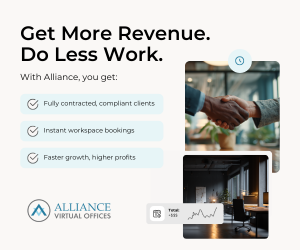Hand-selected flexible workspace news from the most reliable sources to keep you ahead of the pack. We find all the latest news, so you don’t have to. Morning and afternoon updates. Stay in the know.
Here’s what you need to know today:
- How European Employers Are Adjusting Their Operations
- Industrious To Open Location In Iconic Chicago Building
- Digital Immigration Is Transforming Hiring Strategies
- Microsoft Offering Permanent Remote Working Solutions
- Digital Surveillance On Remote Workers Grows
- Curating A Healthy Workplace Culture
How European Employers Are Adjusting Their Operations
European business leaders are taking lessons learned over the last several months and reevaluating the role that remote working plays in a well-oiled workforce.
According to Littler’s European Employer Covid-19 Survey Report, 70% of respondents said they would continue working remotely unless their jobs needed them in the office. Even more, 80% reveal they are requiring or considering offering more remote arrangements for employees.
Employers are considering this transition in order to boost productivity, lower the costs of implementing new safety protocols and closing their offices.
The closure of offices would also alter the role they play in a company. Instead of being a hub where workers attend five days a week, the office would serve as an occasional meeting place only two or three times a week.
While issues about remote working positions have become more prominent, such as problems with mental health, a staggering 90% of respondents said they have made the effort to address their employees’ wellbeing this year.
This includes offering more flexible schedules, as well as receiving feedback about how the organization is navigating the pandemic. However, only 31% said they were offering assistance plans to help their employees to properly address mental health issues.
The report also revealed potential problems that employers will have to face in terms of cutting down their workforce. Many European governments offered programs to keep employees on payrolls throughout the pandemic to keep unemployment low, but 59% said they are expecting to make reductions when the government assistance ends.
Industrious To Open Location In Iconic Chicago Building
Flexible office provider Industrious will open a new location in Chicago’s Willis Tower next year.
The new 52,000 square foot space is part of the company’s over 600,000 square feet of recently announced or opened spaces in 2020. The firm has signed a management agreement with EQ Office where it will outfit the space with flexible offices and other common area amenities that abide by current health and safety practices.
Willis Tower is currently undergoing a restoration project that will include 125,000 square feet of amenities, a 30,000 square foot outdoor terrace and garden, as well as 300,000 square feet of retail and dining options in the base of the building.
“Moving forward, the office is going to need to be somewhere people want to be, and EQ has done an incredible job of making Willis Tower somewhere workers would want to spend their days,” said Jamie Hodari, CEO and co-founder of Industrious. “What we do at Industrious is an essential part of that, plugging Willis Tower into a broader Chicago network that puts power in employees’ hands to choose where to work, and when to work there. The Industrious at Willis Tower is going to be the best workplace in a city full of great workplaces.”
Digital Immigration Is Transforming Hiring Strategies
The world’s massive migration to remote working positions has triggered a shift in how employers think about their hiring strategies. Now, potential talent isn’t required to move away from their homes in order to get their dream job.
In fact, a survey of engineers found that 40% of respondents from Canada and Mexico did not want to come to the US for jobs.
Digital immigration has arrived as technology transformation becomes our norm, and with it comes the newfound ability to connect a diverse group of workers who are not restricted by location.
It is evident that modern companies who think outside their geographical environment will have a leg up on competition, while driving innovation and diversity.
So how can companies begin expanding their talent pool search? For starters, it is important to have clear hiring criteria that aligns with the company’s needs as each talent market has its own set of strengths and weaknesses. This includes salary affordability, working experience and more.
Once your criteria has been established, look into which markets would work best for your company. For instance, 88% of engineers said they prefer working in time zones that are within two hours of their colleagues. Even more, South America has a talent pool of 1.2 million engineers that are rarely considered for US positions.
Researching local entrepreneurial communities and university systems can also help companies identify which areas have the strongest representation of your company’s industry.
Microsoft Offering Permanent Remote Working Solutions
Microsoft will allow employees to work from home permanently according to an internal memo.
The memo described the company’s plan to build a hybrid workplace, with employees having the ability to work from home for less than 50% of the work week.
It adds that managers will have the ability to approve permanent remote working positions for workers who request it, with Microsoft covering home office expenses.
The majority of the company’s 150,000-person workforce is currently working remotely. Those who can work from home full-time may have the ability to relocate if they are approved.
“The COVID-19 pandemic has challenged all of us to think, live, and work in new ways,” said Kathleen Hogan, Microsoft’s chief people officer. “We will offer as much flexibility as possible to support individual workstyles, while balancing business needs, and ensuring we live our culture.”
Digital Surveillance On Remote Workers Grows
Digital surveillance has become an unfortunate outcome of the recent mass transition to remote working positions.
Many remote workers have been required to download spying software so companies can monitor what their employees are doing all day.
Tools like Hubstaff, which tracks mouse movements, keyboard strokes and webpage visits, are used in an effort to maintain productivity while working remotely.
Despite these invasive practices not being illegal, the continuous spying is causing employees to feel constantly stressed, which leads to burnout.
A survey from Fishbowl found that three-quarters of employees were opposed to using an app or other product to trace their communication with colleagues. However, many expressed fear of discipline if they speak out against these policies.
With remote working arrangements seemingly here to stay for the foreseeable future, companies need to reevaluate their priorities when managing a distributed workforce.
This includes ensuring that workers have the proper training to use remote resources, proper connectivity to get work done efficiently and the home office supplies to help them manage their daily tasks.
Measuring success through keystrokes ends up being counterproductive, but business leaders can come out stronger than ever before with the right tools needed for employee engagement. That is why advocates for workers’ rights need to support stronger legal data protection.
Curating A Healthy Workplace Culture
Companies who have a strong workplace culture are often able to deliver higher quality service and an atmosphere that retains top talent.
Developing a user-centric approach to design is the foundation of a company that values culture. When building out the optimal workspace for employees, companies reveal that their priorities are focused on inspiring and making workers feel comfortable
Still, company culture means more than highlighting values. Culture should focus on creating the ideal work environment so employees can be as efficient as possible.
Clearly defining the goals and purposes of a company are one thing, but nurturing a safe atmosphere for employees to speak up without fear of judgment is what sets a strong company culture apart.
However, it is important to note that company culture is an organic growth. Leaders who try to control their culture or guide it to a “solution” miss the point. Unexpected obstacles are bound to be in the way, and how a company deals with these hurdles becomes the defining characteristic of work culture.
Still, trying to let your company culture emerge on its own can be just as damaging as trying to control it. Culture is a flowing process that calls for planned and naturally occurring strategies. It means guiding how people should behave, what colleagues should expect from one another and what behavior is rewarded.


 Dr. Gleb Tsipursky – The Office Whisperer
Dr. Gleb Tsipursky – The Office Whisperer Nirit Cohen – WorkFutures
Nirit Cohen – WorkFutures Angela Howard – Culture Expert
Angela Howard – Culture Expert Drew Jones – Design & Innovation
Drew Jones – Design & Innovation Jonathan Price – CRE & Flex Expert
Jonathan Price – CRE & Flex Expert














